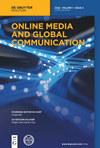Sahara Reporters and Premium Times online coverage of the Russia–Ukraine war
引用次数: 0
Abstract
Abstract Purpose The mass media have continued to be significant news sources for human society, particularly during conflict and war. The media dependency theory posits that during crisis or instability, society relies more on traditional and new media to help it understand the developments in the war. This article investigated the frequency of the coverage of the Russia–Ukraine War by Sahara Reporters and Premium Times, ascertained the most dominant tone used by Sahara Reporters and Premium Times in the reporting of the Russian–Ukraine War, and unfurled the frame of coverage of Russian–Ukraine War by Sahara Reporters and Premium Times. Theoretical and Methodical Considerations Anchored in Robert Entman’s Framing Theory, online publications of Sahara Reporters and Premium Times from March 2022 to September 2022 served as the population of the study and the census sampling technique was used to draw a sample for the study. The explanation-building model was the method of data analysis. Findings Results showed that Sahara Reporters and Premium Times reports on the 2022 Russian–Ukraine War were frequent. Also, they paid more attention to the impacts of the war on Nigerian emigrants or students overseas in Russia and Ukraine. Implications Our findings suggest that online newspapers mostly toned the Russian–Ukraine War in negative slants and framed the stories highlighting the impact of the war on Nigerians, especially Nigerian students in Russia and Ukraine. Value The article brings a new perspective to the Russian–Ukraine War in media scholarship by examining Nigeria’s online news reporting of the Russian–Ukraine conflict. It is, therefore, recommended that Nigerian online newspapers not solely focus on negative reports of the war and its implications for stakeholders in Nigeria. They should adopt a more diverse range of frames and tones in their coverage, to influence stakeholders to take action to prevent wars and hold the Nigerian government accountable for providing adequate infrastructure and human capital that discourages emigration in search of a better life both academically and otherwise.撒哈拉记者和高级时报在线报道俄乌战争
大众传媒一直是人类社会重要的新闻来源,特别是在冲突和战争期间。媒体依赖理论认为,在危机或不稳定时期,社会更多地依赖传统媒体和新媒体来帮助其了解战争的发展。本文通过对《撒哈拉记者》和《高级时报》报道俄乌战争的频率进行调查,确定了《撒哈拉记者》和《高级时报》在报道俄乌战争时使用的最主要语气,展开了《撒哈拉记者》和《高级时报》报道俄乌战争的框架。根据罗伯特·恩特曼的框架理论,2022年3月至2022年9月期间,《撒哈拉记者》和《优质时报》的在线出版物作为研究对象,并使用人口普查抽样技术为研究抽取样本。数据分析的方法是建立解释模型。结果显示,《撒哈拉记者报》和《溢价时报》对2022年俄乌战争的报道频率较高。此外,他们更关注战争对俄罗斯和乌克兰的尼日利亚移民或海外学生的影响。我们的研究结果表明,在线报纸大多以负面倾向来渲染俄乌战争,并将故事的框架突出了战争对尼日利亚人的影响,尤其是在俄罗斯和乌克兰的尼日利亚学生。本文通过考察尼日利亚对俄乌冲突的网络新闻报道,为媒体学术研究俄乌战争提供了一个新的视角。因此,建议尼日利亚在线报纸不要只关注战争的负面报道及其对尼日利亚利益攸关方的影响。它们应在报道中采用更多样化的框架和色调,以影响利益攸关方采取行动,防止战争,并要求尼日利亚政府负责提供足够的基础设施和人力资本,以阻止为追求更好的学术和其他生活而移民。
本文章由计算机程序翻译,如有差异,请以英文原文为准。
求助全文
约1分钟内获得全文
求助全文
来源期刊

Online Media and Global Communication
Communication, Media Studies, Internet Studies, International Studies, International Relations-
自引率
0.00%
发文量
0
期刊介绍:
Online Media and Global Communication (OMGC) is a new venue for high quality articles on theories and methods about the role of online media in global communication. This journal is sponsored by the Center for Global Public Opinion Research of China and School of Journalism and Communication, Shanghai International Studies University, China. It is published solely online in English. The journal aims to serve as an academic bridge in the research of online media and global communication between the dominating English-speaking world and the non-English speaking world that has remained mostly invisible due to language barriers. Through its structured abstracts for all research articles and uniform keyword system in the United Nations’ official six languages plus Japanese and German (Arabic, Chinese, English, French, Russian, Spanish, Japanese, and German), the journal provides a highly accessible platform to users worldwide. Its unique dual track single-blind and double-blind review system facilitates manuscript reviews with different levels of author identities. OMGC publishes review essays on the state-of-the-art in online media and global communication research in different countries and regions, original research papers on topics related online media and global communication and translated articles from non-English speaking Global South. It strives to be a leading platform for scientific exchange in online media and global communication.
For events and more, consider following us on Twitter at https://twitter.com/OMGCJOURNAL.
Topics
OMGC publishes high quality, innovative and original research on global communication especially in the use of global online media platforms such as Facebook, TikTok, YouTube, Twitter, Instagram, WhatsApp, Weibo, WeChat, Wikipedia, web sites, blogs, etc. This journal will address the contemporary concerns about the effects and operations of global digital media platforms on international relations, international public opinion, fake news and propaganda dissemination, diaspora communication, consumer behavior as well as the balance of voices in the world. Comparative research across countries are particularly welcome. Empirical research is preferred over conceptual papers.
Article Formats
In addition to the standard research article format, the Journal includes the following formats:
● One translation paper selected from Non-English Journals that with high quality as “Gems from the Global South” per issue
● One review essay on current state of research in online media and global communication in a country or region
 求助内容:
求助内容: 应助结果提醒方式:
应助结果提醒方式:


